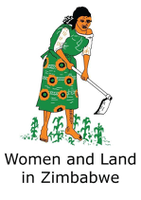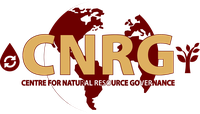Terms Of Reference (ToR): Recruitment of a short-term Individual Consultant to conduct a study/investigation
Job Description
Centre for Natural Resource Governance is looking for a qualified professional natural resource governance, human rights, community development consultant to undertake a study of investigation on the risk factors exposing communities to the impact of resource extraction targeting the Shurugwi Mining area.
Terms Of Reference (ToR)
General Information
Services/Work Description: Recruitment of a short-term Individual Consultant to conduct a study/investigation. The purpose of this study is to explore and identify the various risk factors that expose rural communities to the negative impacts of resource extraction, with a focus on rural communities.
Contract Type: Individual Consultancy
Location: Shurugwi
Duration: 15 working days
Expected Start Date: Upon signing of contract
About Centre for Natural Resource Governance Centre for Natural Resource Governance (CNRG) is a research and advocacy civil society organization, working in Zimbabwe to promote citizen participation and good governance of natural resources for the ultimate benefit of communities that live in resource-rich areas.
We believe in enabling individuals and communities as active citizens and leaders, with the agency to design the now and the future they want to live in – the now and the future that respects, protects, and nurtures the environment.
We believe that social justice and dignity are the bedrock of sustainable social and economic development, that is human-oriented and pro-poor. In order to realize justice in the extractives and natural resource sector and to promote dignity of communities affected by extractive
activities, we believe there is need for us to build the capacity of such communities to hold the state and corporates accountable. Empowering them to voice their concerns, make decisions regarding their natural resource’s extraction, and demand benefits (local content) that accrue from their natural resource exploitation. In the Zimbabwean context, we view research as a tool that informs advocacy for state responsiveness, compliance, and policy change for the betterment of local communities' welfare.
Objective of the Consultancy
1. Objectives: The main objectives of the study are as follows:
a. Identify and analyse the social, economic, environmental, and cultural risk factors that rural communities face in relation to resource extraction activities.
Study/Investigation on risk factors exposing rural communities to impact of resource extraction
b. Assess the impacts of these risk factors on rural communities, including but not limited to displacement, loss of livelihoods, environmental degradation, health risks, and social disintegration.
c. Examine the existing legal and policy frameworks regarding resource extraction and their effectiveness in safeguarding the rights and well-being of rural communities.
d. Identify best practices and successful case studies from other regions or countries that have effectively addressed or mitigated the identified risk factors.
e. Provide recommendations and propose strategies to enhance the empowerment and
protection of rural communities in the context of resource extraction activities.
The interested candidates should propose and outline a detailed work plan indicating the processes to be taken in pursuit of the task. The work plan will allow CNRG to follow through the plan and work being done by the consultant.
Duties and Responsibilities
2. Scope of Work: The study will include the following tasks:
a. Review existing literature, reports, and studies related to the impacts of resource extraction on rural communities, with a specific focus on the selected region or country.
b. Conduct field visits and interviews with relevant stakeholders, including rural community members, local authorities, government officials, civil society organizations, and industry representatives.
c. Analyse data collected from the field visits and interviews to identify key risk factors, their impacts, and potential mitigation measures.
d. Assess the legal and policy frameworks in place regarding resource extraction and
evaluate their effectiveness in protecting the rights and well-being of rural communities.
e. Identify and analyse successful case studies and best practices from other regions or countries that have effectively addressed or mitigated risk factors associated with resource extraction.
f. Develop a comprehensive report outlining the findings, conclusions, and recommendations based on the analysis conducted.
3. Deliverables: The consultant(s) will be responsible for the following deliverables:
a. An inception report detailing the methodology, work plan, and data collection instruments within TWO weeks after the commencement of the study.
b. A draft report presenting the findings, analysis, and recommendations within ONE week after the completion of the field visits.
c. A final report incorporating feedback from stakeholders and reviewers, including an
executive summary, main report sections, and annexes, within ONE week after the
submission of the draft report.
5. Timeline: The study is expected to be completed within FOUR weeks from the
commencement date. The timeline should include sufficient time for field visits, data
analysis, and report writing.
6. Ethics and Confidentiality: The study should adhere to ethical research practices,
ensuring informed consent of participants, confidentiality, and data protection. All
data collected and analysed during the study should be handled and stored securely.
7. Language: The study will be conducted in [language], and all deliverables should be
submitted in English.
Qualifications and Experience
Qualifications and Expertise
Primary expertise required: The ideal consultant(s) should possess the following
qualifications and expertise:
a. Demonstrated experience in conducting studies or investigations related to social and
environmental impacts of resource extraction.
b. Strong knowledge of the selected region, including its cultural, social, economic, and
political context.
c. Familiarity with international best practices and standards related to community
engagement, human rights, and sustainable development in the context of resource
extraction.
d. Excellent analytical and report writing skills.
e. Ability to work collaboratively with diverse stakeholders and ensure an inclusive and
participatory approach.
• Ability to work independently and organise meetings.
• Good understanding of mining impacts on communities.
• Strong research and excellent writing skills in English
• Demonstrated ability to meet deadlines and work under pressure.
How to Apply
Institutional arrangements
The following institutional arrangements will apply:
− The service provider will have a contract with CNRG, and payment will be made as per
the signed contract between the service provider and CNRG.
− The service provider will be supervised by the CNRG Programs Manager.
How to Apply?
Interested candidates should submit the following:
1. Expression of interest to take up the assignment - separate technical & financial
proposals (INVOICE plus a Tax Clearance Certificate)
Proposal Submission: Interested consultant(s) should submit a technical and financial proposal,
highlighting relevant experience, proposed methodology, timeline, and budget, to
[email protected] by WEDNESDAY 14 FEBRUARY 2024 @17:00hrs
Please ensure your email subject clearly reads the topic applied for.
Similar Listings

Consultant for Developing Internal Lending and Savings Schemes (ISALS) Tracking Portfolio Tool
Women and Land in Zimbabwe — Harare

Call for a Consultant to facilitate the development of HOSPAZ RESOURCE MOBILISATION AND STRATEGIC PARTNERSHIPS DEVELOPMENT
Unknown — Unknown

Location: Harare
Company: Centre for Natural Resource Governance CNRG
Expiry Date: 2024-02-14 00:00:00
